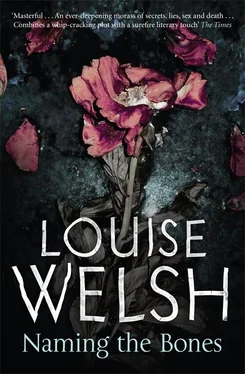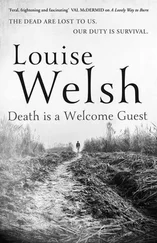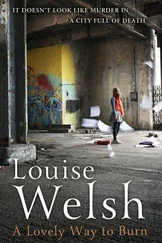Rab Purvis had been more forthright than a casual listener might expect a professor of chivalric romance to be.
‘She’s a ballbreaker. I wouldn’t touch her with a bargepole.’
Murray had glanced at his friend’s tubby abdomen and tried to imagine Rachel propositioning Rab as she had him, shutting the door of his office on sports afternoon Wednesday, pushing the essays he’d been trawling through to one side, sitting on the edge of his desk, so close he’d wondered, then guiding his hand under her sweater so that the quality of his wonder had shifted and magnified.
‘It wasn’t a bargepole that I was thinking of.’
‘Any kind of pole. Leave well alone, if you know what’s good for you.’
‘What if it’s my one last chance of true love?’
‘Then run for the hills. Rachel Houghton isn’t looking for love, Murray. She’s happy with Fergus. She simply likes spicing things up by screwing around.’
‘And what’s wrong with that?’
‘Nothing, if shagging your head of department’s wife doesn’t bother you.’
‘Why should it?’
‘Would you like me to give you a list?’
‘Not really.’
But his friend had gone on to recite a long, frequently crude but eminently sensible catalogue of reasons why Murray Watson should steer clear of Rachel Houghton. It hadn’t made one iota of difference. The affair remained acknowledged but unmentioned again, until now.
Murray took Rab’s proffered hand and shook it.
‘She just dumped me.’
‘Ah.’ Rab sucked another inch off his pint. ‘In that case I take back my apology. You’re better off out of it. You know what the department’s like. A busy little hive with bees swarming all over each other and Fergus at the centre, gobbling up the golden globules of honey we lay at his feet.’
‘Pollen.’
‘What?’
‘Pollen. The bees bring the queen pollen and she makes it into honey.’
‘Pollen, honey — it’s all the same.’ Rab abandoned the analogy. ‘The place is a poisonous rumour mill. Look,’ his voice took on the fatherly tone that indicated advice was about to be proffered. ‘It’s not easy working where we do. Bad as being a diabetic in a candy shop, all those delectable sweet things passing through your hands every day and you not even allowed the tiniest little lick.’ He laughed. ‘That was slightly filthier than I intended.’
‘It’s okay, I get your drift.’
‘You don’t have to tell me how frustrating it can be. When I started it was different but. .’ Rab drifted off for a moment to the happy land where lecturers and students were still compatible. ‘But times change.’ He sighed, staring into the middle distance. ‘I was having a nice drink until you came in looking like Banquo’s ghost and reminded me how everything has gone to shit. You had a good time and now it’s over, just thank whatever ancient gods it is you worship that you didn’t get caught.’
‘We did. Someone saw us.’
‘Ah,’ Rab sighed. ‘I suppose that would put a different complexion on things.’ He took another sip of his pint. ‘Come on then, don’t leave me in suspense. Who?’
‘I don’t know. Someone. A porter maybe. I had my back to them.’
‘Spare me the gory details,’ Rab grunted. ‘I hope to God it wasn’t a porter. They’ll tell the cleaners, who’ll let slip to the women in the canteen, and once it gets to them you’re lost. Might as well take out a full-page ad in the Glasgow Herald , except there’d be no need.’ He shook his head. ‘If you don’t know who it was, you can’t be sure there’s a problem.’
‘They didn’t see us standing too close in the coffee lounge or exchanging notes in the quads, they saw me rogering her on the desk of my office.’
‘Rogering?’
‘“Making the beast with two backs”, “putting the horns on old Fergus”, or whatever you Romantics call it.’
‘Shagging.’
‘What do you think I should do?’
‘What can you do?’ Rab patted his arm. ‘Get a round in.’
Fowlers had quenched thirsts for at least a hundred years. Its high ceiling was iced with intricate cornicing, its windows frosted with etchings advertising whiskies and beers, which let light filter into the bar, but allowed privacy from passers-by to priests, poets, skivers, fathers on errands or men seeing about dogs, idle students and lovers budgeting towards leaving their spouses. Mrs Noon kept things tight and it was rare to wait too long to be served or to see a fight that got beyond the third punch. Fowlers should have been a nice place for a drink, but it was a dump, a prime contender for a brewery theme-pub revamp. There were no ashtrays on the table, but the ceiling retained its nicotine hue and the smell of unwashed old men, stale beer and the cheap bleach used to sluice down the toilets was no longer masked by cigarette smoke. The bar stools, which harboured men who remembered the city when it was all soot and horseshit, were as scuffed and unsteady on their pins as their occupants. The patterned orange and blue carpet, once loud enough to drown out the Saturday night crowd, had sunk to sludge. Murray tipped back his fifth pint of the evening and decided this was where he belonged.
Phyllida McWilliams and Vic Costello had left an hour or so ago, taking their quarrel to one of the West End restaurants where they were known and dreaded. Phyllida had had trouble getting her arm into the sleeve of her jacket and Murray had guided her hand into the armhole while Vic strode to the door with the single-minded purpose of the practised inebriate.
‘You’re a lovely man, Murray. Take my advice.’ She gathered her bags of shopping; ingredients for another Friday night dinner she was destined not to cook. ‘Never get involved with someone who isn’t available.’
‘What made you say that, Phyllida?’
She shrugged and gave him a silly grin. ‘I have been drinking, you know.’
Now there were three of them left. Lyle Joff, quieter after his phone call, Rab and Murray. They were still at the corner table, but in the hours they had sat there the pub had transformed from a peaceful place where men could swap confidences into a red-faced rammy. The bar was three-deep, the staff quick-pouring wine and pressing more glasses to optics than they had earlier in the evening, but it was still pints that ruled; a shining spectrum of gold, yellows, browns and liquorice black. Not that anyone stopped to admire their drink. People were knocking them back faster than it was possible to serve and from time to time a barmaid would squeeze into the throng and return with a tall column of tumblers, as if gathering ammunition for a siege.
Two thoughts were pinballing around Murray’s brain. The first was his need for another drink, the magic one that would make everything click into place. The second was that he’d drunk too much and should get home before he shipwrecked himself.
Maybe it was the bell that made him think of shipwrecks. It was loud and clanging and spoke to him of treacherous rocks and shattered hulks. What was it like to drown?
‘Pushing the boat out tonight?’
That’s what they were doing, setting out into perilous waters, and none of them in possession of their sea legs. Murray raised his head. Mrs Noon was holding a tin tray loaded with empty tumblers, their rims edged with tides of dead froth. He wasn’t sure he’d ever seen the woman out from behind the bar before.
‘I didn’t know you had legs, Mrs Noon.’ He grinned. ‘I thought you were a mermaid. Great singers, mermaids. They lure poor sailors to their deaths, just for the fun of it. Beautiful creatures, beautiful and cruel.’
‘You wouldn’t want to hear me sing.’ The manageress placed his half-full glass in amongst the empties on her tray. ‘That really would be a cruelty.’ She watched Rab neck the dregs of his pint then took his glass from him. ‘Time to head home, gentlemen.’
Читать дальше












